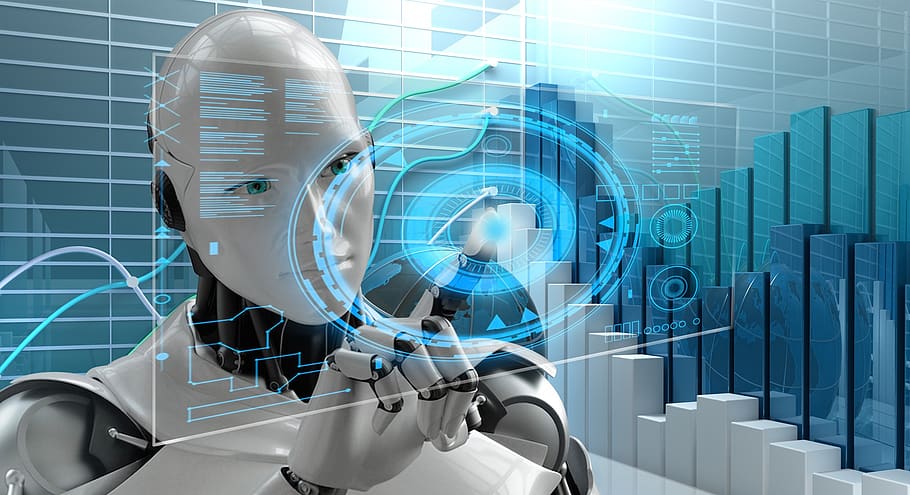
The AI Revolution: Unveiling the Future of Machines

Artificial intelligence, often referred to as AI, is a boundless field with the potential to reshape our world in unimaginable ways. The term itself conjures visions of futuristic robots and self-aware machines, but the reality of AI goes far beyond popular portrayals in movies and science fiction novels. It encompasses a wide range of technologies and techniques that enable machines to mimic human intelligence and perform tasks that were once exclusively the domain of humans.
At its core, artificial intelligence is the science of creating intelligent machines that can analyze and interpret data, learn from experience, and make decisions with minimal human intervention. It combines various branches of knowledge, including computer science, mathematics, psychology, and cognitive science, to emulate human-like cognitive processes such as perception, reasoning, learning, and problem-solving.
Over the years, AI has evolved from a theoretical concept to a tangible reality, fueling advancements across numerous industries and sectors. From autonomous vehicles that navigate bustling city streets to smart assistants that understand and respond to our voice commands, AI has already become an integral part of our daily lives. However, we have only scratched the surface of what AI can achieve.
With ongoing technological advancements and increasing computational power, the future of AI holds incredible potential. It promises to revolutionize industries like healthcare, finance, manufacturing, and transportation by streamlining operations, optimizing resource allocation, and aiding decision-making processes. Additionally, AI opens up new possibilities for scientific discoveries, enabling researchers to unravel complex problems and gain deeper insights into the mysteries of our universe.
While AI offers immense possibilities, it also raises ethical and societal considerations. Questions about job displacement, privacy, and bias in algorithms require careful deliberation to ensure that AI technologies are developed and deployed in a responsible and inclusive manner.
In this age of rapid technological progress, it is essential to understand artificial intelligence and its potential impact. By exploring its limitations, challenges, and opportunities, we can navigate the AI revolution and harness its power to shape a future where humans and machines work in harmony for the betterment of society.
Understanding Artificial Intelligence
Artificial intelligence, often referred to as AI, is an exciting field that encompasses the development of machines capable of performing tasks that typically require human intelligence. Through the advancement of technology, AI has emerged as a transformative force, revolutionizing industries and shaping the way we live and work.
At its core, artificial intelligence involves the creation of intelligent machines that can analyze data, learn from experience, and make decisions or carry out tasks autonomously. This remarkable ability to mimic human behavior is achieved through the development of algorithms and models that enable machines to process and interpret vast amounts of information.
One of the key components of AI is machine learning, which empowers machines to learn from patterns and data, without being explicitly programmed. By analyzing complex datasets, machine learning algorithms can identify trends, make predictions, and provide valuable insights, contributing to advancements in various sectors, such as healthcare, finance, and transportation.
Natural language processing is another crucial aspect of artificial intelligence. This branch of AI focuses on enabling machines to understand and interpret human language. With natural language processing, AI systems can comprehend, translate, and respond to human speech or written text. This capability has led to the development of virtual assistants, chatbots, and language translation tools that enhance communication and accessibility.
With every passing day, artificial intelligence continues to evolve, pushing the boundaries of what machines can achieve. As researchers and technologists explore new possibilities, AI holds tremendous potential to drive innovation and solve complex problems. From self-driving cars to personalized recommendations, artificial intelligence is set to shape the future, transforming the way we interact with technology and unlocking endless possibilities for human progress.
Applications of AI in Various Industries
AI technology is rapidly transforming various industries, revolutionizing the way businesses operate. With its ability to analyze vast amounts of data and make intelligent decisions, artificial intelligence is being implemented in diverse sectors to enhance efficiency and productivity.
In the healthcare industry, AI is being utilized to improve patient care and medical research. Machine learning algorithms can analyze patient data and provide accurate diagnoses, helping doctors in making informed decisions. Additionally, AI is revolutionizing medical research by analyzing complex genetic data, enabling researchers to uncover patterns and develop targeted treatments for diseases.
The finance industry is also witnessing the transformative power of AI. With automated trading systems driven by AI algorithms, financial institutions can make faster and more accurate investment decisions. AI-powered chatbots are being used to handle customer queries and provide personalized recommendations, improving customer experience in the banking sector. Moreover, AI algorithms can analyze vast amounts of financial data in real-time, detecting fraudulent activities and improving security measures.
Transportation and logistics have greatly benefited from AI advancements. Self-driving vehicles, powered by AI technology, are revolutionizing the automotive industry by introducing safer and more efficient transportation solutions. AI algorithms are also being used to optimize delivery routes, reducing operational costs for logistics companies. Additionally, AI-powered virtual assistants are transforming the travel industry by providing personalized recommendations and travel planning assistance to customers.
In conclusion, artificial intelligence is revolutionizing various industries, ushering in a new era of efficiency and productivity. From healthcare to finance to transportation, AI applications are reshaping the way businesses operate, enabling them to achieve better outcomes and provide enhanced services to their customers.
Challenges and Future of AI
The continuous advancement in artificial intelligence is undoubtedly exciting, but it does not come without its fair share of challenges. As we delve into the future of AI, it becomes imperative to address some key obstacles that lie ahead.
First and foremost, privacy and data security emerge as serious concerns in the realm of artificial intelligence. With the vast amount of data being collected and analyzed, ensuring the protection of personal information is crucial. As AI systems become more complex and pervasive, measures must be taken to safeguard individuals’ privacy and prevent any misuse of their data.
Another challenge lies in the ethical implications of AI. As machines become more capable of making decisions, we must navigate the moral landscape surrounding their actions. Questions arise regarding the accountability of AI systems, understanding who is responsible in case of unintended consequences, and establishing a framework for guiding their behavior ethically.
Additionally, the rapid progression of AI raises concerns about the displacement of human labor. As automation becomes more prevalent across various industries, there is a growing need to address the potential impact on employment. It is essential to find ways to mitigate job displacement and ensure that humans can adapt to the changing landscape by focusing on skills that complement and collaborate with AI.
However, even with these challenges in mind, the future of AI is brimming with immense possibilities. AI has the potential to revolutionize healthcare, education, transportation, and countless other fields. By leveraging the power of AI, we can make significant advancements in areas such as disease diagnosis, personalized learning, and efficient transportation systems.
In conclusion, while AI presents challenges in privacy, ethics, and employment, it also offers a future filled with opportunities for progress. It is crucial for us to address these challenges head-on and work towards a future where artificial intelligence contributes positively to society, enhancing our lives while upholding our values.



